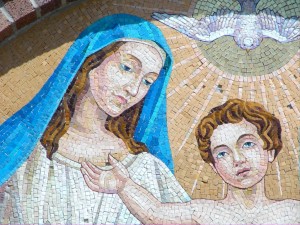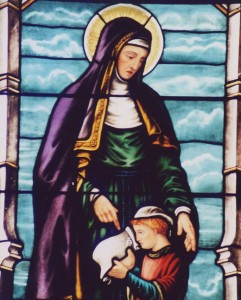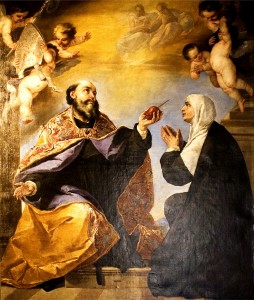St. Monica
Patron Saint of Mothers
Feast Day: August 27

The circumstances of St. Monica’s life could have made her a nagging wife, a bitter daughter-in-law and a despairing parent, yet she did not give way to any of these temptations.
Our knowledge of Monica comes almost entirely from the writings of her much-loved son, the great Doctor of the Church, St. Augustine of Hippo. His relationship with his mother was a close one, especially during Monica’s last years. In Book IX of St. Augustine’s “Confessions” he gives us many details of her life and expresses his gratitude for her devotion in moving terms. Monica was born about the year 332 in Tagaste, North Africa, of a Christian family of some substance. We are given one episode of her childhood which suggests a possible origin for her firmness of will. She was sometimes sent down to the cellar to draw wine for the family, and fell into the habit of taking secret sips. She developed such a passion for wine that before long she was drinking great draughts of it whenever opportunity offered. One day a family slave who had been spying on the little girl denounced her as a wine-bibber, and Monica, covered with shame, gave up the habit. Soon afterwards she was baptized, and thenceforth seems to have led a life of irreproachable virtue.
Although she was a Christian, her parents gave her in marriage to a pagan, Patricius, who lived in her hometown of Tagaste in North Africa. Patricius had some redeeming features, but he had a violent temper. Monica also had to bear with a cantankerous mother-in-law who lived in her home. Patricius criticized his wife because of her charity and piety, but always respected her. Monica’s prayers and example finally won her husband and mother-in-law to Christianity. Her husband died in 371, one year after his baptism.

ns, was sent to Carthage, so that he might develop his talents and become a man of culture. He took to learning naturally, but he also spent time in youthful carousing. Monica was distressed to learn that her son was living an immoral life, so much so, that she refused at first to allow him to live at home.

She relented only after having seen a vision. One day as she was weeping over his behavior, a figure appeared and asked her the cause of her grief. She answered, and a voice issued from the mysterious figure, telling her to dry her tears; then she heard the words, “Your son is with you.” Monica related this story to Augustine, and he replied that they might easily be together if she gave up her faith, for that was the main obstacle keeping them apart. Quickly she retorted, “He did not say I was with you: he said that you were with me.” Augustine was impressed by the quick answer and never forgot it. Although his conversion was not to take place for nine long years, Monica did not lose faith. She stayed close to her son, continually fasted, prayed, and wept on his behalf. In fact, she often stayed much closer than Augustine wanted.
Monica and Patricius had three children, Navigius, who seems to have been an exemplary son, Augustine, and Perpetua, a daughter, who became a Religious. Augustine, the more brilliant of the sons, was sent to Carthage, so that he might develop his talents and become a man of culture. He took to learning naturally, but he also spent time in youthful carousing. Monica was distressed to learn that her son was living an immoral life, so much so, that she refused at first to allow him to live at home.
She relented only after having seen a vision. One day as she was weeping over his behavior, a figure appeared and asked her the cause of her grief. She answered, and a voice issued from the mysterious figure, telling her to dry her tears; then she heard the words, “Your son is with you.” Monica related this story to Augustine, and he replied that they might easily be together if she gave up her faith, for that was the main obstacle keeping them apart. Quickly she retorted, “He did not say I was with you: he said that you were with me.” Augustine was impressed by the quick answer and never forgot it. Although his conversion was not to take place for nine long years, Monica did not lose faith. She stayed close to her son, continually fasted, prayed, and wept on his behalf. In fact, she often stayed much closer than Augustine wanted.

When he was 29, Augustine decided to go to Rome to teach rhetoric. Monica was determined to go along. One night he told his mother that he was going to the dock to say goodbye to a friend. Instead, he set sail for Rome. By going to Italy, Augustine had hoped he could free himself from his mother, however he could not escape from her prayers. Monica followed her son to Italy.
She continued her prayers for Augustine during his years of instruction. At Easter, 387, St. Ambrose baptized Augustine and several of his friends. By his marvelous conversion, Monica’s sorrow had turned to joy. Although no one else was aware of it, Monica knew her life was near the end. She told Augustine, “Son, nothing in this world now affords me delight. I do not know what there is now left for me to do or why I am still here, all my hopes in this world being now fulfilled.” She became ill shortly after and suffered severely for nine days before her death.
Excerpts from American Catholic and Eternal Word Television Network
